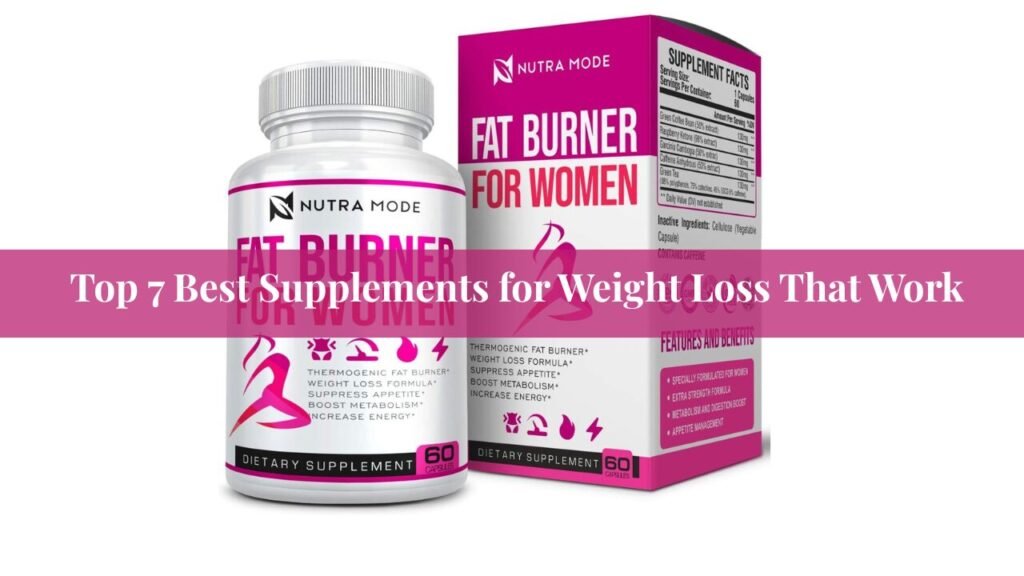Losing weight is one of the most common health goals, yet it remains one of the most challenging. With the rise of health-conscious lifestyles, countless weight loss supplements flood the market, promising quick results and easy fat loss. But the question remains: which ones actually work?
In this article, we dive deep into the best supplements for weight loss based on scientific research. These are not magic pills, but evidence-based aids that may enhance your results when combined with a balanced diet and regular physical activity. Whether you’re just beginning your weight loss journey or looking for an extra edge, this guide will help you make smart, informed decisions about what to try and what to avoid.
What Are Weight Loss Supplements?
Weight loss supplements include a wide variety of products such as pills, powders, drinks, or capsules that claim to help reduce appetite, increase fat metabolism, or improve digestion. They typically include vitamins, minerals, plant extracts, fiber, or stimulants.
It’s important to note that supplements are not regulated as strictly as medications. Their effectiveness and safety may vary depending on the formulation and the individual using them. According to experts, supplements should support a healthy lifestyle, not replace it. The foundation of fat loss remains simple: eat fewer calories than you burn, prioritize nutrient-rich foods, and stay active. Supplements may help optimize metabolism, control hunger, or improve energy when used responsibly.
Green Tea Extract
Green tea extract is one of the most researched supplements in the weight loss industry. It contains high levels of antioxidants known as catechins, particularly epigallocatechin gallate (EGCG), which has been shown to boost metabolism and increase fat burning.
This extract increases energy expenditure and fat oxidation. Some studies suggest it can also enhance the effects of exercise by promoting fat metabolism during activity and even at rest. A meta-analysis published in the International Journal of Obesity found that green tea extract could lead to moderate reductions in body weight and body fat, especially when combined with exercise. However, the effects tend to be modest rather than dramatic.
Caffeine
Caffeine is one of the most widely consumed stimulants in the world. Found naturally in coffee, tea, and some herbs like guarana and yerba mate, caffeine is also a common ingredient in fat-burning supplements.
It stimulates the central nervous system, leading to increased alertness, energy, and metabolism. It also promotes the release of fatty acids from fat stores, which the body can then use as energy. Studies have shown caffeine can increase metabolic rate by 3–11% and boost fat burning by up to 29% in lean individuals. However, people who consume caffeine regularly may develop a tolerance, reducing its effectiveness over time.
Probiotics
Probiotics are beneficial bacteria that live in your gut and play a crucial role in digestion, immune function, and even weight regulation. Certain strains may support weight loss by improving gut health and influencing appetite-regulating hormones.
Probiotics may help prevent the absorption of dietary fat, increase the release of appetite-regulating hormones, and reduce inflammation, a factor commonly linked with obesity. A 2018 review of 15 high-quality trials found that probiotics, especially strains like Lactobacillus gasseri and Bifidobacterium, helped overweight individuals reduce body fat, BMI, and waist circumference.
Berberine
Berberine is a compound extracted from plants such as goldenseal, barberry, and tree turmeric. Traditionally used in Ayurvedic and Chinese medicine, berberine is gaining attention for its metabolic benefits.
It helps regulate insulin sensitivity, lowers blood sugar, and improves lipid metabolism. These effects can indirectly support weight loss, especially in individuals with insulin resistance or metabolic syndrome. A 2022 review of 41 randomized controlled trials found that berberine significantly reduced body weight, waist circumference, and improved cholesterol profiles when taken consistently for at least eight weeks.
Magnesium
Magnesium is a vital mineral involved in over 300 enzymatic reactions in the body, including energy production, glucose metabolism, and hormonal balance. A deficiency in magnesium may impair these functions, potentially contributing to weight gain.
It helps regulate insulin and blood sugar levels, both of which are crucial for appetite control and fat storage. It also reduces cortisol, a stress hormone associated with belly fat retention. Research suggests that magnesium supplementation can reduce inflammation, improve insulin sensitivity, and support weight loss efforts, particularly in those with deficiencies, PCOS, or metabolic disorders.
Chitosan
Chitosan is a substance derived from the shells of crustaceans such as shrimp and crabs. It is marketed as a “fat blocker” because it’s thought to bind to dietary fats in the digestive tract and prevent their absorption.
Chitosan binds with fat molecules in the gut, preventing their digestion and absorption. This may lead to slightly fewer calories being absorbed from meals. Some small studies suggest that chitosan supplementation may result in modest weight loss (around 5–6 pounds) over several months. It may also lower total and LDL cholesterol, although results across studies are inconsistent.
Chromium
Chromium is a trace mineral often included in weight loss supplements. It is believed to enhance the action of insulin and help regulate blood sugar levels, which may influence appetite and cravings.
Chromium may help reduce hunger and food intake by stabilizing blood sugar and promoting the activity of neurotransmitters involved in mood and cravings. A review of multiple trials found that chromium picolinate may result in small reductions in body weight (about 1–3 pounds), especially in individuals with type 2 diabetes or insulin resistance. However, the effects appear modest and inconsistent.
Are Weight Loss Supplements Worth It?
Supplements can provide an extra boost, but they are not magic pills. When used strategically, they may help support a healthy metabolism, control cravings and appetite, improve digestion and nutrient absorption, and enhance energy levels for workouts.
However, no supplement can replace the fundamentals of healthy weight loss: calorie control, nutrient-dense food, physical activity, stress management, and sleep. Choosing the right supplement depends on your specific needs, health status, and lifestyle habits. Always buy from reputable brands, look for third-party testing, and check in with your doctor if you have any health conditions or take medications.
FAQs
1. Do weight loss supplements work without exercise or diet changes?
Supplements may offer modest benefits, but they’re most effective when combined with a healthy diet and regular physical activity.
2. Are natural supplements safer than synthetic ones?
Not necessarily. Natural supplements can still have side effects or interact with medications, so always use them with caution.
3. How long should I take a supplement before expecting results?
Most supplements require consistent use for at least 4–8 weeks to show measurable effects, depending on your health and lifestyle.
Conclusion
The best supplements for weight loss are those that complement a healthy lifestyle rather than replace it. Green tea extract boosts metabolism and fat burning, while caffeine increases energy and metabolic rate. Probiotics improve gut health and may aid in fat loss. Berberine is ideal for managing blood sugar, and magnesium supports hormonal balance. Chitosan may reduce fat absorption, and chromium helps control blood sugar and cravings. Sustainable habits remain key to long-term success. Visit boxing essential to explore more.




